 France (1897) – Dunois, La Hire
France (1897) – Dunois, La HireWW1 French Cruisers
Sfax | Tage | Amiral Cecille | D'Iberville class | Dunois class | Foudre | Davout | Suchet | Forbin class | Troude class | Alger class | Friant class | Linois class | Descartes class | D'Assas class | D’Entrecasteaux | Protet class | Guichen | Chateaurenault | Chateaurenault | D'Estrées class | Jurien de la Graviere | Lamotte-Picquet classDupuy de Lome | Amiral Charner class | Pothuau | Jeanne d'Arc | Gueydon class | Dupleix class | Gloire class | Gambetta class | Jules Michelet | Ernest Renan | Edgar Quinet class
A strange mix of characteristics
The Torpedo Cruiser was a development of the controversial Jeune École (“Young school”) a strategic naval concept that argued that the large ironclad battleships then being built in Europe could be easily and cheaply defeated by small torpedo-armed warships. Most nations including UK would built some in the 1880-1890s but the concept proved ill-fated and most of these ships were used for other tasks in 1914.
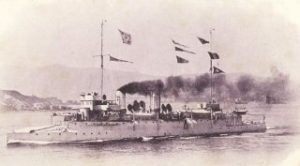
Dunois in 1914
The Dunois class
Dunois and La Hire, named after two famous knights who fought alongside with Joan of Arc, followed the class of d’Iberville, but differed in that they adopted reversed bridges in their design, bottom front and rear. They were lighter, but despite more power (hp 7500 against 5000), failed to exceed 22 knots. Wrongly classified as TB destroyers as being too slow, they were none the less neither really destroyers of cruisers, as they did not possessed Torpedo tubes.
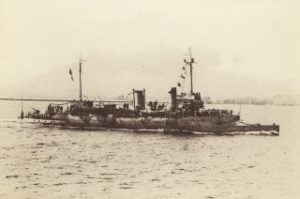
Lahire in 1914
Operational carrer
Dunois spend the most of the great war as a gunboat, offering an artillery support to the British troops from Dunkirk. She was removed from the lists in 1920. Lahire, assigned as a gunnery training ship in Toulon made patrols throughout the Mediterranean. In 1918, a short overhaul saw her equipped with two 100 mm Model 1917 guns and six recent QF 47 mm plus deep charge racks. She will be removed from service, stricken and paid off in 1922.
Links
List of French Torpedo Cruisers
French torpedo cruisers
Specs Conway’s all the world fighting ships 1860-1906.
Provence class specifications |
|
| Dimensions | 166 x 26,9 x 9,8 m |
| Displacement | 899 tonnes FL |
| Crew | 137 |
| Propulsion | 2 screws, 4 Normand Sigaudy, boilers, 7500 hp |
| Speed | 22 knots (40.7 km/h; 25.3 mph) |
| Armament | 2 x 65 mm, 6 x 47 mm QF |
| Armor | None |
Gallery
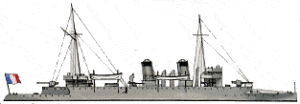
Dunois in 1914
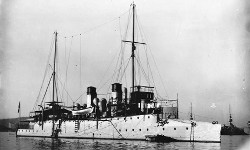
The Dunois in the 1890s
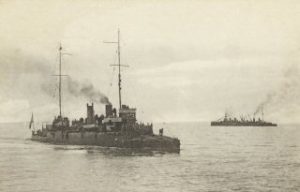
Dunois and cruiser Gloire in the Mediterranean, 1900s

 Latest Facebook Entry -
Latest Facebook Entry -  X(Tweeter) Naval Encyclopedia's deck archive
X(Tweeter) Naval Encyclopedia's deck archive Instagram (@navalencyc)
Instagram (@navalencyc)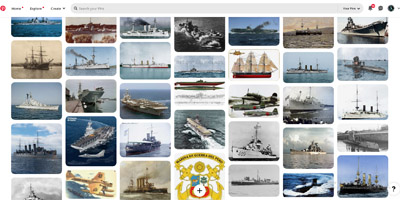


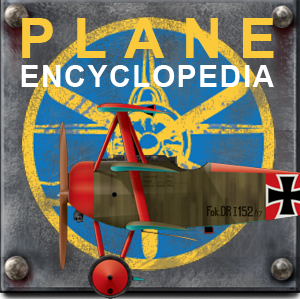
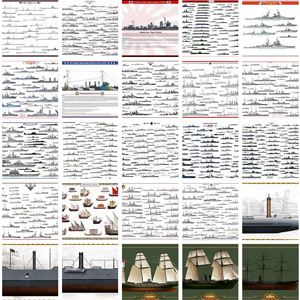
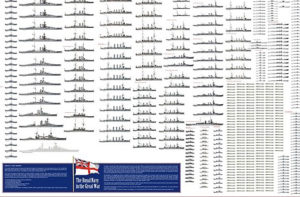
 French Navy
French Navy Royal Navy
Royal Navy Russian Navy
Russian Navy Armada Espanola
Armada Espanola Austrian Navy
Austrian Navy K.u.K. Kriegsmarine
K.u.K. Kriegsmarine Dansk Marine
Dansk Marine Nautiko Hellenon
Nautiko Hellenon Koninklije Marine 1870
Koninklije Marine 1870 Marinha do Brasil
Marinha do Brasil Osmanlı Donanması
Osmanlı Donanması Marina Do Peru
Marina Do Peru Marinha do Portugal
Marinha do Portugal Regia Marina 1870
Regia Marina 1870 Nihhon Kaigun 1870
Nihhon Kaigun 1870 Preußische Marine 1870
Preußische Marine 1870 Russkiy Flot 1870
Russkiy Flot 1870 Svenska marinen
Svenska marinen Søværnet
Søværnet Union Navy
Union Navy Confederate Navy
Confederate Navy Armada de Argentina
Armada de Argentina Imperial Chinese Navy
Imperial Chinese Navy Marinha do Portugal
Marinha do Portugal Mexico
Mexico Kaiserliche Marine
Kaiserliche Marine 1898 US Navy
1898 US Navy Sovietskiy Flot
Sovietskiy Flot Royal Canadian Navy
Royal Canadian Navy Royal Australian Navy
Royal Australian Navy RNZN Fleet
RNZN Fleet Chinese Navy 1937
Chinese Navy 1937 Kriegsmarine
Kriegsmarine Chilean Navy
Chilean Navy Danish Navy
Danish Navy Finnish Navy
Finnish Navy Hellenic Navy
Hellenic Navy Polish Navy
Polish Navy Romanian Navy
Romanian Navy Turkish Navy
Turkish Navy Royal Yugoslav Navy
Royal Yugoslav Navy Royal Thai Navy
Royal Thai Navy Minor Navies
Minor Navies Albania
Albania Austria
Austria Belgium
Belgium Columbia
Columbia Costa Rica
Costa Rica Cuba
Cuba Czechoslovakia
Czechoslovakia Dominican Republic
Dominican Republic Haiti
Haiti Hungary
Hungary Honduras
Honduras Estonia
Estonia Iceland
Iceland Eire
Eire Equador
Equador Iran
Iran Iraq
Iraq Latvia
Latvia Liberia
Liberia Lithuania
Lithuania Mandchukuo
Mandchukuo Morocco
Morocco Nicaragua
Nicaragua Persia
Persia San Salvador
San Salvador Sarawak
Sarawak Uruguay
Uruguay Venezuela
Venezuela Zanzibar
Zanzibar Warsaw Pact Navies
Warsaw Pact Navies Bulgaria
Bulgaria Hungary
Hungary

 Bundesmarine
Bundesmarine Dutch Navy
Dutch Navy Hellenic Navy
Hellenic Navy Marina Militare
Marina Militare Yugoslav Navy
Yugoslav Navy Chinese Navy
Chinese Navy Indian Navy
Indian Navy Indonesian Navy
Indonesian Navy JMSDF
JMSDF North Korean Navy
North Korean Navy Pakistani Navy
Pakistani Navy Philippines Navy
Philippines Navy ROKN
ROKN Rep. of Singapore Navy
Rep. of Singapore Navy Taiwanese Navy
Taiwanese Navy IDF Navy
IDF Navy Saudi Navy
Saudi Navy Royal New Zealand Navy
Royal New Zealand Navy Egyptian Navy
Egyptian Navy South African Navy
South African Navy






























 Ukrainian Navy
Ukrainian Navy dbodesign
dbodesign